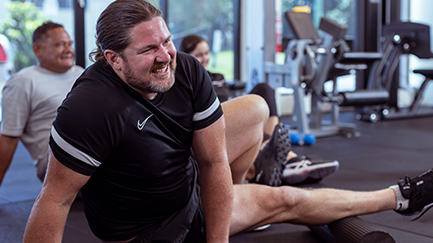
Supporting veterans through service related injuries
The Mates4Mates physical rehabilitation team is here to help veterans improve mobility, manage pain and enhance their overall wellbeing.

Exercising and moving our bodies is vital for our physical and mental health, but sometimes it can be hard to consistently meet a daily structured amount. This is where incidental exercise can play a key role, as some form of exercise is always better for your physical and mental health than none.
There are a variety of ways to include physical activity into your daily schedule. Whether it be accumulated in smaller amounts throughout the day, or through structured, longer sessions, both types of activity produce similar health benefits.
However, some people may experience barriers to completing regular exercise and don’t know how to start becoming more active. By including more incidental exercise into your day, you will start to experience vital physical and mental health benefits.
So, what is incidental activity?
It’s any activity built up in small amounts over the day. Some simple examples of incidental exercise include:
Did you know that Mates4Mates offer a range of social connection activities which includes incidental exercise in a safe and non-judgemental environment? Find out more here.
The benefits of incidental exercise
Through including incidental exercise into your day and slowly increasing your movement levels, you can help prevent and reduce the risk of health conditions such as heart disease, diabetes, and some cancers, and can improve poor mental health. Regular exercise also plays a role in managing chronic pain.
In addition to these benefits, regular exercise can also aid in improving sleep quality, mood, energy levels and functional capacity to improve overall wellbeing. Individuals who suffer from mental illness often experience poor sleep quality and a reduction in energy levels. Single bouts of exercise have been shown to increase total sleep time and energy and reduce fatigue.
Engaging in group exercise is also another great way to improve social connections and gain extra motivation which can have significant positive impacts on your physical, mental and social health.
Many people find it easier to be active in lots of little ways throughout the day. Remember to think of all types of physical activity as a chance to improve your health and to think of movement as an opportunity, not an inconvenience.
If you would like further guidance on including more exercise and movement in your lifestyle or recovery journey, the Mates4Mates exercise physiologists are here to provide advice and tailor an individual plan to achieve your goals without risk of injury, fatigue, or burn-out.
Tips to slowly build up your exercise levels
Start simple
Any form of exercise is better than none, so start at a level that you can manage and slowly progress to the recommended guidelines. Why not track your progress and little wins for that extra reward to help with motivation.
Find what you like
Completing exercises that you enjoy will go a long way in ensuring you stick to it. Experiment with different modalities of exercise to find what’s right for you (remember, exercise should be enjoyable!). Mates4Mates offers group fitness, hydrotherapy, mindful movement, and osteoarthritis prevention classes with our qualified exercise physiologists to help you decide what will benefit you most.
Recruit a mate
Ask a friend or family member to complete some exercise with you for added company and motivation, or you can even take your pet out for a walk so you both can enjoy the benefits of being active.
Set goals
By setting specific, measurable and achievable goals, this will help you to stay on track with your new exercise plans. As you to start to increase your exercise levels, be sure to plan a regular exercise schedule around your commitments so that you’ve got enough time to achieve your goals.
Written by Luke Morrison, Mates4Mates Exercise Physiologist

The Mates4Mates physical rehabilitation team is here to help veterans improve mobility, manage pain and enhance their overall wellbeing.